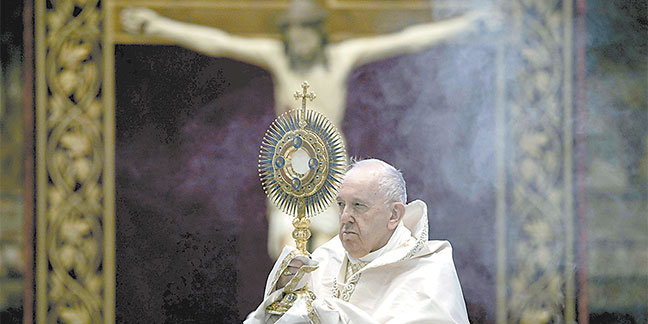 Pope Francis leads Benediction as he celebrates Mass marking the feast of Corpus Christi in St. Peter's Basilica at the Vatican in this June 14, 2020, file photo. (CNS | Vatican Media)When most people hear the words “Corpus Christi,” it is the coastal Texas town they might think of first. However, for Catholics, these words have a far deeper meaning.
Pope Francis leads Benediction as he celebrates Mass marking the feast of Corpus Christi in St. Peter's Basilica at the Vatican in this June 14, 2020, file photo. (CNS | Vatican Media)When most people hear the words “Corpus Christi,” it is the coastal Texas town they might think of first. However, for Catholics, these words have a far deeper meaning.
Corpus Christi Sunday, also known as the Solemnity of the Most Holy Body and Blood of Christ, falls on Sunday, June 11, this year.
Each year on this solemn feast, the Church honors Our Lord, celebrating the Real Presence of the Body, Blood, Soul and Divinity of Jesus Christ in the Eucharist.
Corpus Christi is Latin for “Body of Christ.”
The feast day was established in 1246 by Bishop Robert de Thorte of Liege at the suggestion of St. Juliana of Mont Carvillon. It was extended to the universal Church by Pope Urban IV in 1264 after St. Thomas Aquinas, a Doctor of the Church, proposed a feast focused solely on the Holy Eucharist that emphasized the joy of the Real Presence of Jesus. Having recognized in 1264 the authenticity of a Eucharistic miracle in Bolsena, the pontiff, then living in Orvieto, established the feast of Corpus Christi on August 11, 1264, as a solemnity for the whole Roman Catholic Church. The office was composed by St. Thomas Aquinas, and the procession was approved by Popes Martin V and Eugene IV.
Corpus Christi is a “moveable” feast: originally observed on the Thursday after Trinity Sunday. In 1970 it was shifted to the Sunday after Trinity Sunday for U.S. dioceses and most of the world.
Traditions of Corpus Christi
On this holy day that honors Our Lord’s Presence in the Eucharist, after Mass Our Lord is placed in a monstrance that is then carried by a priest to four different altars representing the four corners of the earth. While processing, the congregation follows and sings. At each altar there are readings and prayers.
The procession is followed by Benediction of the Blessed Sacrament.
Each year in Rome, the pope presides over a Eucharistic procession on the Feast of Corpus Christi. The procession begins at the Archbasilica of St. John Lateran and proceeds to the Basilica of St. Mary Major, where it concludes with Benediction.
Saints on Corpus Christi
Here are a few inspiring quotes from saints about the Body, Blood, Soul and Divinity of Christ.
St. Thomas Aquinas: “The Eucharist is the sacrament of love: it signifies love, it produces love. The Eucharist is the consummation of the whole spiritual life.”
St. Euphrasia: “To speak of the Blessed Sacrament is to speak of what is most sacred. How often, when we are in a state of distress, those to whom we look for help leave us; or what is worse, add to our affliction by heaping fresh troubles upon us. He is ever there, waiting to help us.”
St. John Chrysostom: “It is not the man who is responsible for the offerings as they become Christ’s Body and Blood; it is Christ Himself who was crucified for us. The standing figure belongs to the priest who speaks these words. The power and the grace belong to God. ‘This is My Body,’ he says. And these words transform the offerings.”
St. Maximilian Kolbe: “If angels could be jealous of men, they would be so for one reason: Holy Communion.”
St. Pio of Pietrelcina: “A thousand years of enjoying human glory is not worth even an hour spent sweetly communing with Jesus in the Blessed Sacrament.”
St. Angela of Foligno: “If we paused for a moment to consider attentively what takes place in this sacrament, I am sure that the thought of Christ’s love for us would transform the coldness of our hearts into a fire of love and gratitude.”
St. Augustine: “What you see is the bread and the chalice; that is what your own eyes report to you. But what your faith obliges you to accept is that the bread is the Body of Christ, and the chalice is the Blood of Christ. This has been said very briefly, which may perhaps be sufficient for faith; yet faith does not desire instruction.”
— Spencer K.M. Brown
At www.eucharisticrevival.org: Find Church resources, videos, educational materials, prayers and more at the National Eucharistic Revival movement’s website – designed to restore understanding and devotion to the Eucharist
 The Catholic Church as always fostered a strong devotion to St. Joseph as the head of the Holy Family, yet he has become increasingly prominent in the spiritual life of the Church over the past 150 years as Patron of the Universal Church.
The Catholic Church as always fostered a strong devotion to St. Joseph as the head of the Holy Family, yet he has become increasingly prominent in the spiritual life of the Church over the past 150 years as Patron of the Universal Church.
Here’s a look at why St. Joseph is so important to our faith and the Church:
Our Lord and Savior Jesus Christ chose to enter the world through the human family. He came as an infant born into the marriage and home of the two holiest people who ever lived: Joseph and Mary.
Because of his special role as foster-father of Jesus, St. Joseph has merited singular privileges in heaven unmatched by any saint except the Blessed Virgin Mary. There is no greater model than St. Joseph from whom we can learn how to live virtuously in imitation of Jesus and Mary.
Certain saints have received special insight into his holiness and the wonderful power of his heavenly intercession.
“Devotion to St. Joseph is one of the choicest graces that God can give to a soul, for it is tantamount to revealing the entire treasury of our Lord’s graces,” wrote St. Peter Julian Eymard, “When God wishes to raise a soul to greater heights, he unites it to St. Joseph by giving it a strong love for the good saint.”
Read more testimonies about the power of St. Joseph’s intercession at www.yearofstjoseph.org.
Also on the website during this Year of St. Joseph, some of the saint’s titles and patronages – as listed in the Litany of St. Joseph – are being explored more deeply as monthly themes:
- January – Most Valiant Protector of Church
- February – Joseph Most Chaste
- March – Joseph Most Just
- April – Lover of Poverty
- May – Model of Workers
- June – Joseph Most Obedient and Head of Holy Family
- July – Joseph Most Faithful
- August – Mirror of Patience
- September – Joseph Most Prudent
- October – Terror of Demons
- November – Patron of Dying and Solace of the Afflicted
- December – Chaste Guardian of Virgins and Pillar of Families
St. Joseph is most well known as the patron saint of fathers, families and workers. However, he is in fact efficacious over many causes.
As St. Thomas Aquinas once noted, “Some saints are privileged to extend to us their patronage with particular efficacy in certain needs, but not in others; but our holy patron St. Joseph has the power to assist us in all cases, in every necessity, in every undertaking.”
Throughout history many of the Church’s sons and daughters have successfully gone to St. Joseph for various needs. As a result, St. Joseph has become known for his intercession for the following professions and causes: against doubt, against hesitation, accountants and bursars, attorneys, cabinetmakers and carpenters, cemetery workers and grave diggers, children, civil engineers, confectioners, craftsmen, dying people and for a happy and holy death, educators, immigrants and exiles, furniture makers, house hunters, interior souls, laborers, married people,
orphans, people in doubt, people who fight Communism, pioneers, pregnant women, social justice, teachers, travelers, unborn children, and working people.
— Catholic News Herald
Don’t miss this!
St. Joseph Vietnamese Church in Charlotte is offering a Votive Mass of St. Joseph every first Wednesday of the month at 6 p.m. The next Mass will be offered Wednesday, Feb. 5.
The parish also welcomes you to join in special prayers to St. Joseph in front of its St. Joseph Shrine, located in front of the church, every third Saturday at 8 p.m. The next prayer vigil will be held Saturday, Feb. 15.
St. Joseph Vietnamese Church is located at 4929 Sandy Porter Road in south Charlotte.
More online
At www.yearofstjoseph.org: Find educational resources, prayers and devotions, and “Year of St. Joseph” event details from across the diocese, as dates for special events are finalized.


